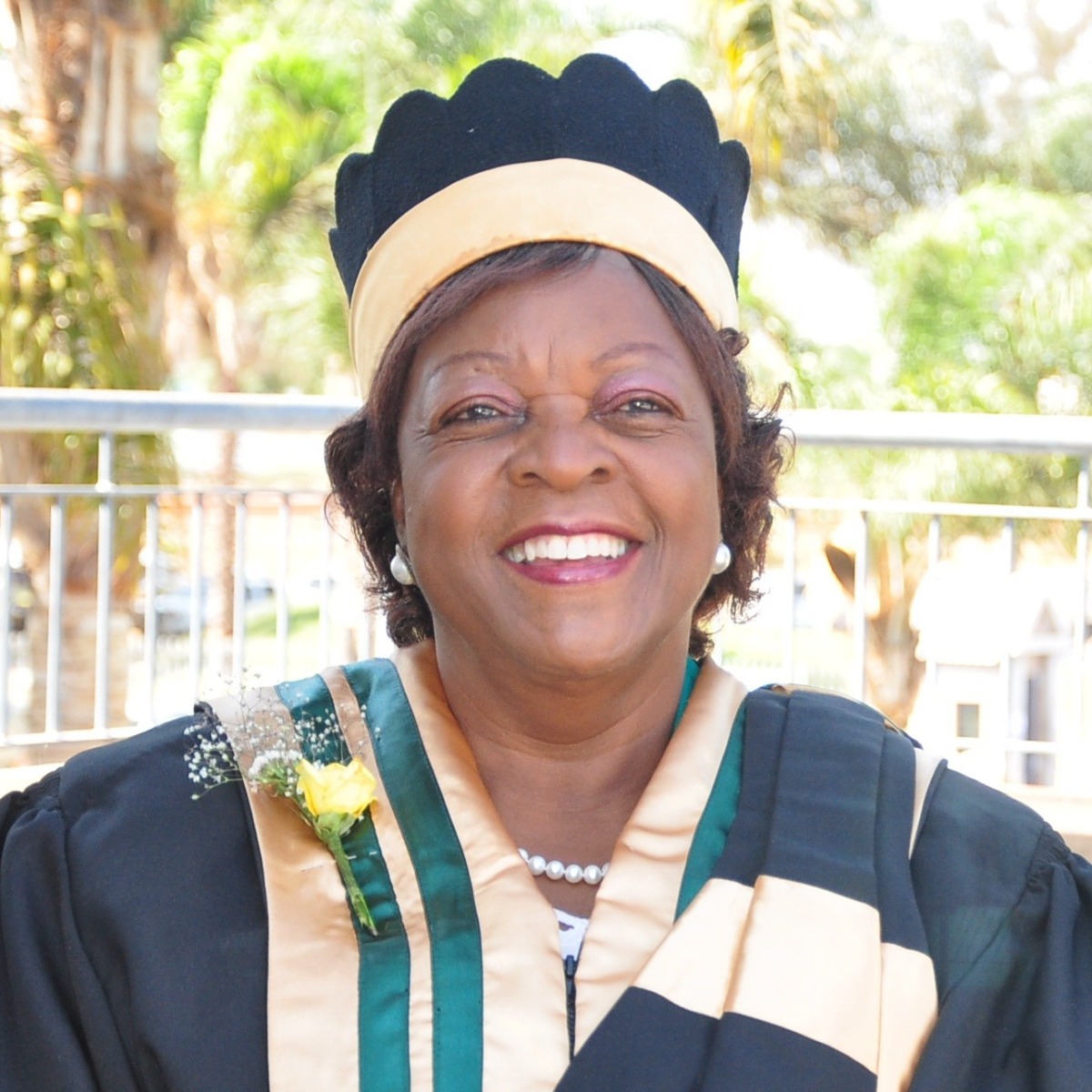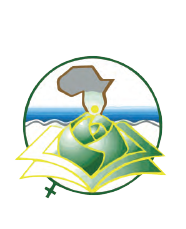
Trustee & Co-Founder
Co-Founder, Trustee and Founding Vice Chancellor
Professor Emeritus Hope Cynthia Sadza holds a PhD in Public Administration from the University of Zimbabwe. The title of her thesis is Critical Organisational Problems of Administering and Managing Social Development in a Newly Independent Public Service: The Case of Zimbabwe. She did her Bachelors and Masters Degrees in Public Administration at the University of Missouri in the United States of America. Professor Sadza did her High School Education at Goromonzi High. She trained and qualified as a school teacher at Waddilove Teacher’s College.
Her work experience commenced as a teacher in 1964. At Independence in 1980, she became Registrar of the Apprenticeship Authority in the Ministry of Manpower Planning and Development. She is one of the founding Directors of the Zimbabwe Institute of Public Administration. From 1987 to 1989 she was a member of the Public Service Review Commission responsible for setting up structures of the Civil Service Commission now known as the Public Service Commission. She was a Public Service Commissioner from 1990 to 2000. Professor Sadza served on Boards and Trusts that include;

Trustee & Co-Founder
Co-Founder, Trustee and Founding Vice Chancellor
Professor Emeritus Hope Cynthia Sadza holds a PhD in Public Administration from the University of Zimbabwe. The title of her thesis is Critical Organisational Problems of Administering and Managing Social Development in a Newly Independent Public Service: The Case of Zimbabwe. She did her Bachelors and Masters Degrees in Public Administration at the University of Missouri in the United States of America. Professor Sadza did her High School Education at Goromonzi High. She trained and qualified as a school teacher at Waddilove Teacher’s College.
Her work experience commenced as a teacher in 1964. At Independence in 1980, she became Registrar of the Apprenticeship Authority in the Ministry of Manpower Planning and Development. She is one of the founding Directors of the Zimbabwe Institute of Public Administration. From 1987 to 1989 she was a member of the Public Service Review Commission responsible for setting up structures of the Civil Service Commission now known as the Public Service Commission. She was a Public Service Commissioner from 1990 to 2000. Professor Sadza served on Boards and Trusts that include;

Trustee & Co-Founder
Dr Fay Chung
Founder of the Women’s University in Africa. Dr Fay King Chung is a Zimbabwean. She was educated at the University of Zimbabwe, where she received her first degree (1962), her postgraduate Certificate in Education (1965) and her Doctorate (1999).
She also studied at Leeds University, where she obtained her M. Phil. In English Literature (1971) and has undertaken research at St Antony’s College, Oxford (1995). She diversified into economics and completed a distance-education degree at the School of Oriental and African Studies, London in 2002. Following retirement she enrolled in an honours degree program in Economic at the University of Zimbabwe.
Dr Chung’s career has been almost exclusively in education. As an undergraduate she was involved in organising students to teach house servants and workers in the vicinity of the campus. One of the tasks was to eradicate illiteracy. She has always had a vision to provide leadership in Africa through access to relevant quality tertiary education.
From 1963 to 1968 Dr Chung taught at high schools levels at Ascot and Harare High Schools in Zimbabwe. While studying for her M. Phil. Degree at Leeds University, she taught as a part-time lecturer at Leeds Polytechnic and at the Kitson College of Engineering from October 1968 to June 1970. She was a lecturer in the School of Education at the University of Zambia from 1971 to 1975. From 1975 to 1980 she worked fulltime for the Zimbabwe African National Union (ZANU), in charge of teacher education and curriculum development for Zimbabwean refugees schools in Mozambique.
After Zimbabwe’s independence in 1980, Dr Chung worked in various capacities in the Ministry of Education, including as the first acting director for the Zimbabwe Integrated National Teacher Education Course (ZINTEC), which was initiated at independence to train 9,000 primary teachers through a combination of face-to-face teaching and distance education; as head of educational planning in the ministry, with responsibility for planning the expansion for the primary, secondary and teacher training programs; as head of the curriculum development unit, tasked with transforming the curricula for primary and secondary schools; as deputy secretary in charge of school administration; and finally as minister of Education and Culture. She spent a total of 14 years in the government of Zimbabwe.
Dr Chung has been involved in a number of non-governmental organisations. She took part in the formation of the Zimbabwe Foundation for Education with Production (ZIMFEP), set up to provide education for war veterans and returning refugee children from Mozambique and Zambia. School leavers were assisted through placement in further training and in jobs, or through the establishment of cooperatives.
She has been a board member of the Zimbabwe Institute of Development Studies (ZIDS). She is a founder member of the Forum for African Women Educationalists (FAEW), a network of education ministers, women university vice-chancellors and other women educational leaders in Africa, focused on strengthening the education of girls and women in Africa. Dr Chung is the founder member of the Association for Strengthening Higher Education for Women in Africa (ASHEWA).
Dr Chung’s work has an international dimension. She was a member of the Delors Commission Education and worked as the chief of the education cluster at UNICEF, New York (1993-98), then as the first director of the UNESCO International Institute for Capacity Building in Africa (IICBA) in Addis Ababa (1998-2003). Between 1998 and 2003 she served as an honorary special advisor to the Organisation of African Union (OAU) and later to the African Union (AU).
Dr Chung is a member of the Zimbabwe National Education Advisory Board as of 18 March 2009.
Publications
Chung Fay, ‘Re-Living the Second Chimurenga: Memories from Zimbabwe’s Liberation Struggle,’ The Nordic Africa Institute, Weaver Press 2006

Trustee & Co-Founder
Dr Fay Chung
Founder of the Women’s University in Africa. Dr Fay King Chung is a Zimbabwean. She was educated at the University of Zimbabwe, where she received her first degree (1962), her postgraduate Certificate in Education (1965) and her Doctorate (1999).
She also studied at Leeds University, where she obtained her M. Phil. In English Literature (1971) and has undertaken research at St Antony’s College, Oxford (1995). She diversified into economics and completed a distance-education degree at the School of Oriental and African Studies, London in 2002. Following retirement she enrolled in an honours degree program in Economic at the University of Zimbabwe.
Dr Chung’s career has been almost exclusively in education. As an undergraduate she was involved in organising students to teach house servants and workers in the vicinity of the campus. One of the tasks was to eradicate illiteracy. She has always had a vision to provide leadership in Africa through access to relevant quality tertiary education.
From 1963 to 1968 Dr Chung taught at high schools levels at Ascot and Harare High Schools in Zimbabwe. While studying for her M. Phil. Degree at Leeds University, she taught as a part-time lecturer at Leeds Polytechnic and at the Kitson College of Engineering from October 1968 to June 1970. She was a lecturer in the School of Education at the University of Zambia from 1971 to 1975. From 1975 to 1980 she worked fulltime for the Zimbabwe African National Union (ZANU), in charge of teacher education and curriculum development for Zimbabwean refugees schools in Mozambique.
After Zimbabwe’s independence in 1980, Dr Chung worked in various capacities in the Ministry of Education, including as the first acting director for the Zimbabwe Integrated National Teacher Education Course (ZINTEC), which was initiated at independence to train 9,000 primary teachers through a combination of face-to-face teaching and distance education; as head of educational planning in the ministry, with responsibility for planning the expansion for the primary, secondary and teacher training programs; as head of the curriculum development unit, tasked with transforming the curricula for primary and secondary schools; as deputy secretary in charge of school administration; and finally as minister of Education and Culture. She spent a total of 14 years in the government of Zimbabwe.
Dr Chung has been involved in a number of non-governmental organisations. She took part in the formation of the Zimbabwe Foundation for Education with Production (ZIMFEP), set up to provide education for war veterans and returning refugee children from Mozambique and Zambia. School leavers were assisted through placement in further training and in jobs, or through the establishment of cooperatives.
She has been a board member of the Zimbabwe Institute of Development Studies (ZIDS). She is a founder member of the Forum for African Women Educationalists (FAEW), a network of education ministers, women university vice-chancellors and other women educational leaders in Africa, focused on strengthening the education of girls and women in Africa. Dr Chung is the founder member of the Association for Strengthening Higher Education for Women in Africa (ASHEWA).
Dr Chung’s work has an international dimension. She was a member of the Delors Commission Education and worked as the chief of the education cluster at UNICEF, New York (1993-98), then as the first director of the UNESCO International Institute for Capacity Building in Africa (IICBA) in Addis Ababa (1998-2003). Between 1998 and 2003 she served as an honorary special advisor to the Organisation of African Union (OAU) and later to the African Union (AU).
Dr Chung is a member of the Zimbabwe National Education Advisory Board as of 18 March 2009.
Publications
Chung Fay, ‘Re-Living the Second Chimurenga: Memories from Zimbabwe’s Liberation Struggle,’ The Nordic Africa Institute, Weaver Press 2006
Women's University in Africa © 2026
